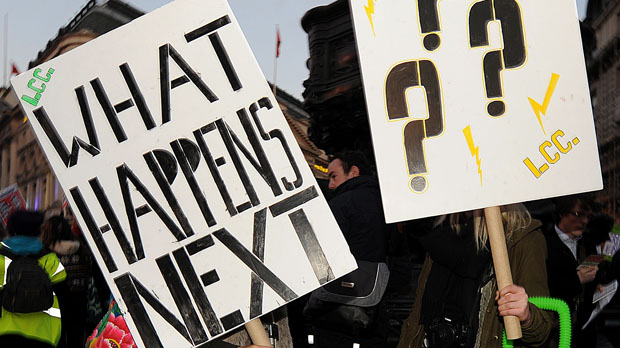Tuition fees and student debt: key issues for NUS President
As the National Union of Students (NUS) prepares to announce its new President, students tell Channel 4 News tuition fees, debt and stress must be top of the agenda.

Rarely have student issues been so prominent on the political agenda.
Plans to triple tuition fees and scrap the Education Maintenance Allowance (EMA) have politicised a generation of young people. Tens of thousands of students, school pupils, teachers and lecturers from across the UK have taken to the streets to protest against the proposals, but to no avail.
MPs voted to raise tuition fees to £6,000 from 2012 at the end of last year, with institutions allowed to charge up to £9,000 in “exceptional circumstances”.
But so far, most universities are charging around the £9,000 mark, with the elite institutions leading the way.
What should the new NUS President's priorities be?
Andy Clarke (via Twitter) - would like to see measures put in place to support middle income students under the new tuition fees scheme.
Becky Midgley (via Twitter) - debt management! How to manage the stress and worry that comes with it.
Michael Palmer (via Twitter) - we need honesty and clear leadership. Not the same old but repackaged.
Yonah Ben-Ashera (via Facebook) - A challenge to the Government's policy on tuition fees which is already beginning to restrict educational provision to the privileged classes.
Lucia Helena (via Facebook) - funding primary and secondary schools.
Outgoing NUS President Aaron Porter has taken a parting shot at the Coalition Government’s policies.
Addressing the NUS annual conference in Gateshead, Mr Porter said: “We meet in the shadow of a struggling and sluggish economy, unprecedented public spending cuts and a Coalition Government that is becoming more arrogant, incompetent and reckless with every day that passes.”
He told delegates that without student action over the last year, they could be facing even higher tuition fees, lower repayment thresholds and higher repayment rates.
James Mills, who founded the Save EMA campaign, told Channel 4 News the most important thing is that the new President “remembers what he represents”.
He said: “The NUS is a collective bargaining organisation, it is not a revolutionary party with one political view, but a collective bargaining organisation made up of different members with differing political views, with the sole goal to get the best deal for the students they represent.
“It is a sleeping giant as a campaigning organisation and that’s why sensible leadership is needed to fully utilise this.”
The candidates
So who would want to take over as President of the NUS at such a challenging time for students?
Mark Bergfeld – Taking on the Tories and building a mass movement against fees, cuts and austerity is top of Mark’s manifesto. He also calls for marches, strikes and occupations, citing the civil disobedience which overturned the poll tax.
Liam Burns – “Making the wrong call will embed tuition fees not defeat them,” says Liam in his manifesto. He has been President of the NUS in Scotland where he says he has made “significant gains for his members”.
Thomas Byrne – “It’s time that the NUS were run in the interests of students rather than ideologues and partisan political careerists,” according to Thomas’s manifesto. He calls for students to be championed every step of the way.
Shane Chowen – “NUS needs a President who can take the debate to the next level and I am the candidate with a fresh perspective on the issues with an agenda to unleash NUS’ full potential as a 7 million strong organisation,” says Shane in his manifesto.